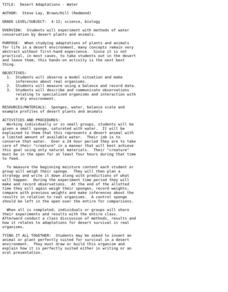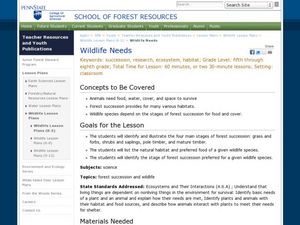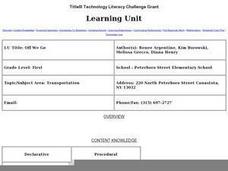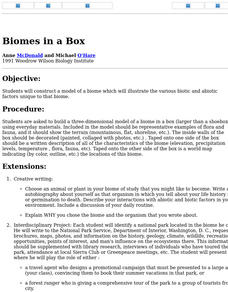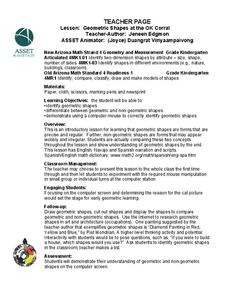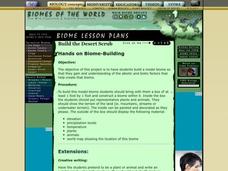Curated OER
Collecting Compost
Students observe a composting box. In this soil lesson plan, students create a composting bin by using a bin, newspaper, worms, and food scraps. Students create a composting food web.
Curated OER
Food Web Follies
Seventh graders cut and paste animal pictures to create a food web and trace the path of energy. They write a paragraph explaining the importance of photosynthesis in all food webs.
Curated OER
What Does Life Look Like Under a Microscope?
Young scholars discover cells make up all living things. In this life science lesson plan, students investigate living organisms and the cells that create them. Finally the young scholars create a testable question, conduct an...
Curated OER
Cell Organelles
High schoolers explore biology by researching living cells. For this living organism lesson, students participate in a role-playing activity in which all the high schoolers in class form one plant cell by portraying specific parts of a...
Curated OER
Dinnertime On The Reef
Students identify the main parts of a coral reef. They describe a coral reef food chain.
Curated OER
Prairies
Students identify the basic characteristics of the prairie ecosystem, and several commonly known prairie species. They create a classroom mural of a prairie ecosystem; and create reports about what they have found out.
Curated OER
Population Density
Students use the scientific method to conduct an experiment and use varied methods to gather background information. They correctly use lab equipment and prepare tables and graphs that organize, conclude, and present their findings. ...
Curated OER
Desert Adaptations: Water
Students experiment with methods of water conservation. In this water conservation lesson, students explore the importance of water for plants and animals in a desert biome.
Curated OER
Engineering and the Senses: Smell
Pupils define the sense of smell. For this smell sense lesson, students review their five senses and define the importance of smell. Pupils practice smelling and identifying items in bags. Students discuss the importance of smell to...
Curated OER
Amazon Rainforest
Seventh graders complete a simulation in which they travel through the Amazon rainforest. Using their map skills, they determine the best route and where to see specific plants and animals. They develop their own database to organize...
Richland County School District One
Incubating Quail Eggs
Students incubate quail eggs. In this biology lesson, students observe the development of the embryo, monitor, turn, weigh the eggs, and observe the hatching of the chicks. They identify the structures within a fertilized egg and their...
Curated OER
Wildlife Needs
Students identify the wildlife needs in a specific setting. In this wildlife needs lesson, students identify and illustrate the four stages of forest succession. Students list the natural habitat and food for a given species. Students...
Curated OER
Ice Age Animals
Students research the ice age and the animals that were on the Earth at that time and have a debate on the explanation for the extinction of the ice age animals.
Curated OER
Everything in Its Place: Science Classification
Students investigate the system of classification for living things through the sixteen lessons of this unit. The five kingdoms of monerans, protists, fungi, plants, and animals form the basis of several experiments as the similarities...
Curated OER
Off We Go
First graders identify different types of transportation, and explain why each is important. They pretend they are going on a trip. They choose their mode of transportation, and use play money to buy their tickets.
Curated OER
The Four Seasons
Learners examine four paintings by Robert Harris and identify the season portrayed. Using the characteristics for each season, they write a poem and create a drawing of their own. In groups, they describe the different types of...
Curated OER
Biomes in a Box
Students construct a three-dimensional model of a biome which illustrates the various biotic and abiotic factors unique to that biome. They use everday materials to represent the important characteristics of a particular biome and then...
Curated OER
Dinosaurs 1: Where Are the Dinosaurs?
Young scholars explore dinosaurs. In this dinosaur identification instructional activity, students watch video clips for different dinosaurs from the Discovery Kids website. Young scholars discuss the clips with their teacher. Students...
Curated OER
Become an Expert
Students practice their researching techniques by preparing a presentation with little notice. In this information research lesson, students utilize the Internet to research one of several subtopics concerning panthers....
Curated OER
Geometric Shapes at the OK Corral
Students explore geometry by utilizing computer software. In this shape identification lesson, students define several geometric shapes by the characteristics that classify them. Students draw and cut out geometric shapes using their...
Curated OER
Hands On Biome-Building
Students create a model biome to understand the abiotic and biotic factors that go into creating a biome. In this biomes lesson plan, students should display plants, animals, temperature, precipitation, and more.
Curated OER
Hands on Biome--Building
Students create a model biome. In this ecology instructional activity, students use materials to create a model biome. There is an extension activity that allows students to write about plants and animals and their specific biome.
Curated OER
Build the Arctic Tundra
Students build a model of biome in order to comprehend the abiotic and biotic factors that are prevalent in a biome. In this hands on building lesson, students use a box to build a biome. . Students decorate the inside and...
Curated OER
Hands On Biome-Building
Students create a desert biome to understand the abiotic and biotic factors of that biome. In this desert biome lesson plan, students include elevation, precipitation, temperature, plants, and more.







